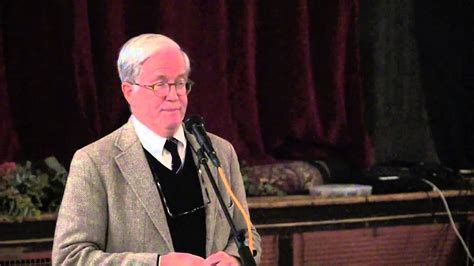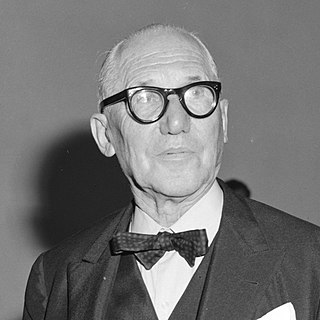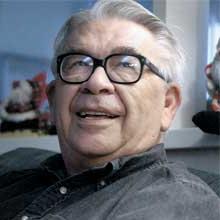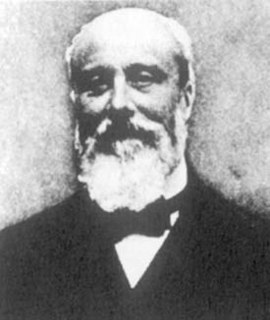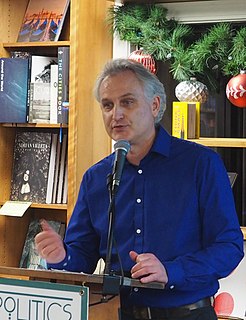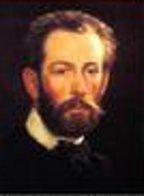Top 891 Distinct Quotes & Sayings - Page 14
Explore popular Distinct quotes.
Last updated on April 22, 2025.
We have two distinct types of political organization to take into account; and clearly, too, when their origins are considered, it is impossible to make out that the one is a mere perversion of the other. Therefore when we include both types under a general term like government, we get into logical difficulties; difficulties of which most writers on the subject have been more or less vaguely aware, but which, until within the last half-century, none of them has tried to resolve.
That the legislative and executive powers of the State should be separate and distinct from the judiciary; and that the members of the two first may be restrained from oppression, by feeling and participating the burdens of the people, they should, at fixed periods, be reduced to a private station, return into that body from which they were originally taken, and the vacancies be supplied by frequent, certain, and regular elections, in which all, or any part of the former members, to be again eligible, or ineligible, as the laws shall direct.
We all know of the dangers and inequities of the traditional digital divide: People who have good access tocomputer networks have a distinct advantage - in terms of both life opportunities and quality of life, I wouldargue - over the vast majority of the world's population that does not yet have good access to computernetworks. The "other" digital divide points to an increasingly unstable situation that has developed inlibrarianship as digital libraries have evolved and matured.
I fear it is sometimes forgotten that God has married together justification and sanctification. They are distinct and different things, beyond question, but one is never found without the other. All justified people are sanctified, and all sanctified people are justified. ... Tell me not of your justification, unless you have also some marks of sanctification. Boast not of Christ's work for you, unless you can show us the Spirit's work in you.
Men say their pinnacles point to heaven. Why, so does every tree that buds, and every bird that rises as it sings. Men say their aisles are good for worship. Why, so is every mountain glen and rough sea-shore. But this they have of distinct and indisputable glory,--that their mighty walls were never raised, and never shall be, but by men who love and aid each other in their weakness.
You and I must realize that the English language is filled with words that, in addition to their literal meanings, convey distinct emotional intensity. For example, if you develop a habit of saying you 'hate' things - you 'hate' your hair; you 'hate' your job; you 'hate' having to do something - do you think this raises the intensity of your negative emotional states more than if you use a phrase like 'I prefer something else'?
Plain experience and common sense inform us that no abstract Person can have made us as we are without also wishing to delete us and start over (Gen. 8:21; Zeph. 1:2). Therefore, the existence of cruel and arbitrary nature, together with the universality of human sin, prevents us from beginning the theological enterprise with any concept of God that is distinct from revelation. All theologies of a cosmic harmonic principle shipwreck on the truths of tragedy, catastrophe, and injustice.
It is ordinarily said that criminal law is designed to protect property and to protect persons, and if society's only interest in controlling sex behavior were to protect persons, then the criminal codes concerned with assault and battery should provide adequate protection. The fact that there is a body of sex laws which is apart from the laws protecting persons is evidence of their distinct function, namely that of protecting custom.
A place (lieu) is the order (of whatever kind) in accord with which elements are distributed in relationships of coexistence. It thus excludes the possibility of two thing being in the same location (place). The law of the 'proper' rules in the place: the elements taken into consideration are beside one another, each situated in its own 'proper' and distinct location, a location it defines. A place is thus an instantaneous configuration of positions. It implies an indication of stability.
It is difficult to generalize about Islam. To begin with, the word itself is commonly used with two related but distinct meanings, as the equivalents both of Christianity, and Christendom. In the one sense, it denotes a religion, as system of beliefs and worship; in the other, the civilization that grew up and flourished under the aegis of that religion. The word Islam thus denotes more than fourteen centuries of history, a billion and a third people, and a religious and cultural tradition of enormous diversity.
He who does not realize to what extent shifting fortune and necessity hold in subjection every human spirit, cannot regard as fellow-creatures nor love as he loves himself those whom chance separated from him by an abyss. The variety of constraints pressing upon man give rise to the illusion of several distinct species that cannot communicate. Only he who has measured the dominion of force, and knows how not to respect it, is capable of love and justice.
If we really believed that those who are gone from us were as truly alive as ourselves, we could not invest the subject with such awful depth of gloom as we do. If we could imbue our children with distinct faith in immortality, we should never speak of people as dead, but passed into another world. We should speak of the body as a cast-off garment, which the wearer had outgrown; consecrated indeed by the beloved being that used it for a season, but of no value within itself.
In part of Lord Kames' Elements of Criticism, he says that "music improves the relish of a banquet." That I deny,--any more than painting might do. They may both be additional pleasures, as well as conversation is, but are perfectly distinct notices; and cannot, with the least propriety, be said to mix or blend with the repast, as none of them serve to raise the flavor of the wine, the sauce, the meat, or help to quicken appetite. But music and painting both add a spirit to devotion, and elevate the ardor.
Architecture is the masterly, correct and magnificent play of masses brought together in light. Our eyes are made to see forms in light; light and shade reveal these forms; cubes, cones, spheres, cylinders or pyramids are the great primary forms which light reveals to advantage; the image of these is distinct and tangible within us without ambiguity. It is for this reason that these are beautiful forms, the most beautiful forms. Everybody is agreed to that, the child, the savage and the metaphysician.
The constitution has divided the powers of government into three branches, Legislative, Executive and Judiciary, lodging each with a distinct magistracy. The Legislative it has given completely to the Senate and House of Representatives. It has declared that the Executive powers shall be vested in the President, submitting special articles of it to a negative by the Senate, and it has vested the Judiciary power in the courts of justice, with certain exceptions also in favor of the Senate.
I am opposing it with an idea of the history of philosophy as a history of philosophers, that is, a history of mortal, fragile and limited creatures like you and I. I am against the idea of clean, clearly distinct epochs in the history of philosophy or indeed in anything else. I think that history is always messy, contingent, plural and material. I am against the constant revenge of idealism in how we think about history.
The widow’s eyebrows raised. “Ye’ve got all these nasty pooches to run around with and ye still might die?” “I’m going to go fight with a god, some demons, and a coven of witches who all want to kill me,” I said, “so it’s a distinct possibility.” “Are y’goin’ t’kill ’em back?” “I’d certainly like to.” “Attaboy,” the widow chuckled. “Off y’go, then. Kill every last one o’ the bastards and call me in the mornin’.
Social evolution is a resultant of the interaction of two wholly distinct factors: the individual ... bearing all the power of initiative and origination in his hands; and, second, the social environment with its power of adopting or rejecting both him and his gifts. Both factors are essential to change. The community stagnates without the impulse of the individual. The impulse dies away without the sympathy of the community.
Man and his deed are two distinct things. Whereas a good deed should call forth approbation and a wicked deed dis-approbation, the doer of the deed, whether good or wicked always deserves respect or pity as the case may be. Hate the sin and not the sinner is a precept which though easy enough to understand is rarely practised, and that is why the poison of hatred spreads in the world.
Lady Placida smiled. “History seldom takes note of serendipity when it records events. And from what I have heard, I suspect an argument could be made that you very much did earn the title.” “Many women have earned titles, Your Grace. It doesn't seem to have been a factor in whether or not they actually received them.” Lady Placida laughed. “True enough. But perhaps that is beginning to change.” She offered her hands. “It is a distinct pleasure to meet you, Steadholder.
When I work there are two distinct phases: the phase of pushing the work along, getting something to happen, where all the input comes from me, and phase two, where things start to combine in a way that wasn't expected or predicted by what I supplied. Once phase two begins everything is okay, because then the work starts to dictate its own terms. It starts to get an identity which demands certain future moves. But during the first phase you often find that you come to a full stop.
In my view the bundle theorist should say that when a bundle is located somewhere, there is an 'instance' of the bundle there. The instance is entirely constituted by the universals of the bundle. But the bundle and the instance are two distinct entities. Bundles of universals can be multiply located, but their instances cannot, and particulars are instances of a bundle of universals.
Never has America lost a war ... But name, if you can, the last peace the United States won. Victory yes, but this country has never made a successful peace because peace requires exchanging ideas, concepts, thoughts, and recognizing the fact that two distinct systems of life can exist together without conflict. Consider how quickly America seems to be facing its allies of one war as new enemies.
Mathematicians are beginning to view order and chaos as two distinct manifestations of an underlying determinism. And neither state exists in isolation. The typical system can exist in a variety of states, some ordered, some chaotic. Instead of two opposed polarities, there is a continuous spectrum. As harmony and discord combine in musical beauty, so order and chaos combine in mathematical [and physical] beauty.
We use up words like 'spiritual' so fast in this culture. Twenty years ago spiritual had a distinct meaning. But now there's a lot of jack-off thinkers who just love to talk about the spiritual. And there is a lot of bogus - is bogosity a word? It should be - a lot of bogosity in these spiritual seekers. So you have to find another way to express it. I just call it 'how I fit'.
I had not lived there a week before my feet wore a path from my door to the pond-side; and though it is five or six years since I trod it, it is still quite distinct. It is true, I fear that others may have fallen into it, and so helped to keep it open. The surface of the earth is soft and impressible by the feet of men; and so with the paths which the mind travels. How worn and dusty, then, must be the highways of the world, how deep the ruts of tradition and conformity!
Asian food is very easy to like because it hits your mouth very differently than European food does. In European food, there may be two things to hit - maybe sweet and salty, maybe salty-savory, … but Asian kind of works around, plus you have that distinct flavor that’s usually working in Asian food.
Gail Anderson-Dargatz has a noticing eye, a voice as unique as the countryside she writes about, and a heart large enough to love her entire cast of distinct and memorable characters. In The Cure for Death by Lightning she fashions an irresistible song out of the joys and dangers of growing up, the mysteries and wonders of life on a farm, the thrilling terror of trying to outrun the awful unseen force that pursues a growing girl. This novel opens a door to a shining, surprising world.
Happiness is your real nature. You identify with yourself with the body and mind, feel it's limitations, and suffer. Realize your true self in order to open the store of happiness. That true self is the reality, the Supreme Truth, which is the self of all the world you now see, the self of all the selves, the One real, the Supreme, the Eternal self - as distinct from the ego or the bodily idea for the self.
In the larger scheme of things, God has commonly effected this purifying by revival or judgement. Strange though it may seem, there are distinct similarities between the ways of God in revival and in judgment... Because of His very nature, God cannot and will not permit spiritual decline to continue unchecked. He is ever halting and reversing the trend of the times by means of revival - or judgment. Where His people are not prepared for the one, they shut themselves up to the other.
Every one has experienced how learning an appropriate name for what was dim and vague cleared up and crystallized the whole matter. Some meaning seems distinct almost within reach, but is elusive; it refuses to condense into definite form; the attaching of a word somehow (just how, it is almost impossible to say) puts limits around the meaning, draws it out from the void, makes it stand out as an entity on its own account.
The man of genius is he whose ego has acquired consciousness. He is enabled by it to distinguish the fact that others are different, to perceive the "ego" of other men, even when it is not pronounced enough for them to be conscious of it themselves. But it is only he who feels that every other man is also an ego, a monad, an individual centre of the universe, with specific manner of feeling and thinking and a distinct past, he alone is in a position to avoid making use of his neighbours as means to an end.
This is the path of prayer-contemplative prayer, that is, as distinct from simple prayers of supplication and thanksgiving-which is a specific discipline of thought, desire, and action, one that frees the mind from habitual prejudices and appetites, and allows it to dwell in the gratuity and glory of all things. As an old monk on Mount Athos once told me, contemplative prayer is the art of seeing reality as it truly is; and, if one has not yet acquired the ability to see God in all things, one should not imagine that one will be able to see God in himself.
Ireland, as distinct from her people, is nothing to me; and the man who is bubbling over with love and enthusiasm for "Ireland," and can yet pass unmoved through our streets and witness all the wrong and the suffering, shame and degradation wrought upon the people of Ireland-yea, wrought by Irishmen upon Irish men and women, without burning to end it, is, in my opinion, a fraud and a liar in his heart, no matter how he loves that combination of chemical elements he is pleased to call Ireland.
It is an item of faith that we are children of God; there is plenty of experience in us against it. The faith that surmounts this evidence and is able to warm itself at the fire of God's love, instead of having to steal love and self-acceptance from other sources, is actually the root of holiness: It is a fatal mistake to think of holiness as a possession which we have distinct from our faith... Faith is the very highest form of our dependence on God.
The one distinct feature of our Association has been the right of the individual opinion for every member. We have been beset at every step with the cry that somebody was injuring the cause by the expression of some sentiments that differed with those held by the majority of mankind. The religious persecution of the ages has been done under what was claimed to be the command of God. I distrust those people who know so well what God wants them to do to their fellows, because it always coincides with their own desires.
With regard to the learned professions, little need be observed; they truly form no distinct interest in society . . . [discussing the landed, merchant, and learned classes in legislative assembly]. Will not the man of the learned profession, who will feel a neutrality to the rivalships between the different branches of industry, be likely to prove an impartial arbiter between them, ready to promote either, so far as it shall appear to him conducive to the general interests of society?
Now these two questions Does there exist a material reality distinct from sensible appearances? and What is the nature of reality? do not have their source in experimental method, which is acquainted only with sensible appearances and can discover nothing beyond them. The resolution of these questions transcends the methods used by physics; it is the object of metaphysics. Therefore, if the aim of physical theories is to explain experimental laws, theoretical physics is not an autonomous science; it is subordinate to metaphysics.
The significance of God, cause, number, substance or soul consists, as James asserts, in nothing but the tendency of the given concept to make us act or think. If the world should reach a point at which it ceases to care not only about such metaphysical entities but also about murders perpetrated behind closed frontiers or simply in the dark, one would have to conclude that the concepts of such murders have no meaning, that they represent no 'distinct ideas' or truths, since they do not make any 'sensible difference to anybody.
London always reminds me of a brain. It is similarly convoluted and circuitous. A lot of cities, especially American ones like New York and Chicago, are laid out in straight lines. Like the circuits on computer chips, there are a lot of right angles in cities like this. But London is a glorious mess. It evolved from a score or so of distinct villages, that merged and meshed as their boundaries enlarged. As a result, London is a labyrinth, full of turnings and twistings just like a brain.
I don't want to rescind American directors but I think that European directors in general, because of the size of the nations in Europe are exposed to all different cultures, they can easily travel from one distinct culture to another in a matter of hours - you can drive for two weeks across the United States and you're in the same basic culture - so there is a certain breadth of understanding and sophistication that they bring to it and frankly, in some cases they are less expensive than American directors.
I look forward to the time when the churches come to celebrate and honour the work of animal protection as an imperative arising from their belief in the Creator and in the gospel of the crucified. After all, similarly remarkable things have happened, for example, the growing consensus among churches that the environment should be cared for and protected as a Christian duty--an astonishing turnaround when one considers the prevailing dualism in previous centuries, which expressly discouraged concern for "earthly" matters as distinct from "spiritual" ones.
Although the assembly of the shots is responsible for the structure of the film, it does not, as is generally assumed, create its rhythm; the distinct time running through the shots makes the rhythm of the picture, and the rhythm is determined not by the length of edited pieces, but by the pressure of the time that runs through them. The pieces that 'won't edit', that can't be properly joined, are those which record a radically different kind of time
Let us admit, without bitterness, that the individual has his distinct interests and can, without felony, stipulate for those interests and defend them. The present has its pardonable amount of egotism; momentary life has its claims, and cannot be expected to sacrifice itself incessantly to the future. The generation which is in its turn passing over the earth is not forced to abridge its life for the sake of the generations, its equals after all, whose turn shall come later on.
When you want a thing deeply, earnestly and intensely, this feeling of desire reinforces your will and arouses in you the determination to work for the desired object. When you have a distinct purpose in view, your work becomes of absorbing interest. You bend your best powers to it; you give it concentrated attention; you think of little else than the realization of this purpose; your will is stimulated into unusual activity, and as a consequence you do your work with an increasing sense of power.
I like woman who doesn't necessarily care if other people like her. She is she who she is and figures people can take it or leave it. What I do like is a woman who has the guts to tell exactly as she feels. It's not appealing when a woman dresses to please a man. It's way more attractive if she has her own distinct style and wears what she feels best in.
The everyday world, as Kant proved, is mere appearance. But it is also the only world in which we can make sense of the idea of a plurality of distinct individuals. We can only distinguish things as different if they occupy different regions of space-time. It follows (a point Kant missed but which the mystics have always understood) that reality 'in itself' is 'beyond plurality' and is, in that sense, 'One'.
What we take ourselves to be doing when we think about what is the case or how we should act is something that cannot be reconciled with a reductive naturalism, for reasons distinct from those that entail the irreducibility of consciousness. It is not merely the subjectivity of thought but its capacity to transcend subjectivity and to discover what is objectively the case that presents a problem....Thought and reasoning are correct or incorrect in virtue of something independent of the thinker's beliefs, and even independent of the community of thinkers to which he belongs. (p. 71)
There are three distinct kind of judges upon all new authors or productions; the first are those who know no rules, but pronounce entirely from their natural taste and feelings; the second are those who know and judge by rules; and the third are those who know, but are above the rules. These last are those you should wish to satisfy. Next to them rate the natural judges; but ever despise those opinions that are formed by the rules.
I am thinking, therefore I exist. (...) I was a substance whose whole essence or nature is solely to think, and which does not require any place, or depend on any material thing, in order to exist. Accordingly this 'I' - that is, the soul by which I am what I am - is entirely distinct from the body, and indeed is easier to know than the body, and would not fail to be whatever it is, even if the body did not exist.
The public psychology of going into debt for gain passes through several more or less distinct phases: (a) the lure of big prospective dividends or gains in income in the remote future; (b) the hope of selling at a profit, and realizing a capital gain in the immediate future; (c) the vogue of reckless promotions, taking advantage of the habituation of the public to great expectations; (d) the development of downright fraud, imposing on a public which had grown credulous and gullible.
It is odd that a value/virtue that plays such a central role in dramatic literature has played such a small role in philosophical writing. There are probably a number of reasons, but I think that a predilection for a certain kind of individualism is a major one. Others might include the fashionability of consequentialism, the idea that loyalty has more to do with sentiment than reason, as well as its proneness to corruption. The revival of interest in virtue/character as distinct from rules/principles has also created space for a renewed, if hesitant, interest in loyalty.
The first "station of separation" corresponds to the state of the ordinary man who perceives the universe as distinct from God. Starting from here, the initiatic itinerary leads the being first to extinction in the divine Unity, which abolishes all perception of created things. But spiritual realization, if it is complete, arrives afterwards at the "second station of separation" where the being perceives simultaneously the one in the multiple and the multiple in the one.
The soul is the perceiver and revealer of truth. We know truth when we see it, let skeptic and scoffer say what they choose ... We distinguish the announcements of the soul, its manifestations of its own nature, by the term Revelation. These are always attended by the emotion of the sublime. For this communication is an influx of the Divine mind into our mind. It is an ebb of the individual rivulet before the flowing surges of the sea of life. Every distinct apprehension of this central commandment agitates men with awe and delight.
First, the constitution ought to secure a genuine and guard against a select militia, by providing that the militia shall always be kept well organized, armed, and disciplined, and include, according to the past and general usuage of the states, all men capable of bearing arms; and that all regulations tending to render this general militia useless and defenceless, by establishing select corps of militia, or distinct bodies of military men, not having permanent interests and attachments in the community to be avoided.
Therefore 'Christ hath tasted death for every man:' not only for all kinds of men, as some vainly talk, but for every one, of all kinds; the benefit of whose offering is not only extended to such, who have the distinct outward knowledge of his death and sufferings, as the same is declared in the scriptures, but even unto those who are necessarily excluded from the benefit of this knowledge by some inevitable accident.
Politics have always covered two distinct kinds of problems: problems of administrative routine, and those that may be called 'questions of the moment.' A question of the moment is, indeed, a substitute for some notion, such as the idea of God, or hereditary monarchy, or national glory, that has hitherto acted as a symbol of human co-ordination. It provides no new positive certainty to replace the discredited certainty, but is what the name implies: the raising of a question which the old certainty no longer answers.







